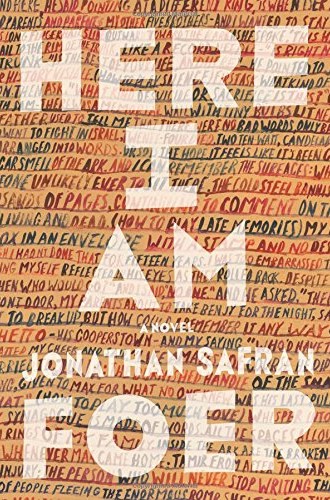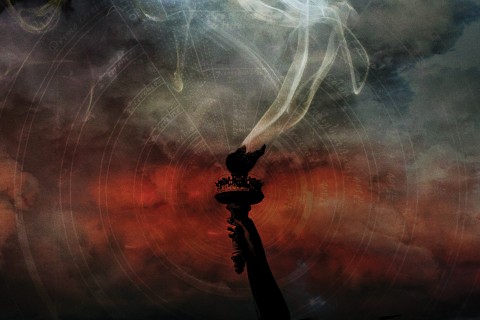In a rare moment of vulnerability with his teenage son Sam, Jacob describes the time when his wife, Julia, corrected him for singing the wrong lyric to a Nirvana song:
“She pointed out that you were wrong?”
“Yeah.”
“That’s so Mom.”
“I was grateful.”
“But you were singing.”
“Singing wrongly.”
“Still. She should have let it go.”
“No, she did the right thing.”
Jacob explains that the lyric, which he had always sung as “I can see from shame” was actually “aqua seafoam shame.” Sam responds with puzzlement: “What’s that even supposed to mean?” “It doesn’t mean anything,” Jacob replies. “That was my mistake. I thought it had to mean something.”
What Jacob doesn’t tell Sam is that Julia’s correction of Jacob occurred while they were in bed together, naked and stoned, after promising each other to be fully honest and withhold nothing—a conversation that culminated for Julia in thrilling sexual gratification resulting solely from the exchange of words. But from that moment on, words began to fail, and the marriage began a slow decline.
Words carry tremendous power. This is why Julia felt it necessary to correct Jacob’s mistaken version of the lyric. It’s why the novel begins with a rabbi threatening to cancel Sam’s bar mitzvah after finding a list of explicit racial epithets on his desk at Hebrew school. It’s why Jacob and Julia’s marriage is undone by the discovery of a secret cell phone filled with sexually explicit text messages. It’s why the comments of world leaders following a catastrophic earthquake in Israel lead to unlikely alliances—Kosovo, Pakistan, Sierra Leone, Turkey, Iraq, Iran, the Islamic State, and Hezbollah find themselves on the same side as a world war looms.
And it’s why the bat mitzvah sermon of Samanta, Sam’s computer-generated version of himself, might be read as a hermeneutical key to the characters’ deepest struggles. The assigned Torah portion for Samanta’s bat mitzvah includes Genesis 22, and her d’var begins with Abraham’s inner conflict as he answers “here I am” to both God and Isaac while knowing he can be loyal to only one of them:
When God asks for Abraham, Abraham is wholly present for God. When Isaac asks for Abraham, Abraham is wholly present for his son. But how can that be possible? God is asking Abraham to kill Isaac, and Isaac is asking his father to protect him. How can Abraham be two directly opposing things at once?
In good Jewish exegetical tradition, Samanta doesn’t attempt to answer every question she raises. The meaning of “here I am” is never fully reconciled—either for Abraham in the biblical story or for the novel’s characters as they struggle to be present with one another across shifting loyalties. Yet, there’s power in the way Samanta names the issues at stake: “My bat mitzvah portion is about many things, but I think it is primarily about who we are wholly there for, and how that, more than anything else, defines our identity.”
The d’var ends with a scathing indictment of Samanta’s family (which is, of course, Sam’s family) for all the ways they fail to be present to one another.
My great-grandfather, who I mentioned before, has asked for help. He doesn’t want to go to the Jewish Home. But nobody in the family has responded by saying, “Here I am.” Instead, they have tried to convince him that he doesn’t know what is best. . . . I was accused of having used some bad language in Hebrew school this morning. When my parents showed up to speak with Rabbi Singer, they didn’t tell me, “Here we are.” They asked, “What did you do?” I wish I had been given the benefit of the doubt.
Samanta ends her speech, warns her guests to leave the synagogue, and blows it up. Not because she’s the virtual creation of an angry 13-year-old boy, but because “he built the synagogue with the hope of feeling, finally, comfortable somewhere” and “if it wasn’t exactly right, it was completely and irretrievably wrong.” He blew it up in order to re-create it.
The line between real life and the virtual world may be fuzzy to a teenage boy addicted to his iPad, but Sam is well aware that real life doesn’t offer the chance to re-create what is broken. The fate of his great-grandfather unfolds slowly, although the Holocaust survivor’s dilemma is articulated in the novel’s first sentence: “When the destruction of Israel commenced, Isaac Bloch was weighing whether to kill himself or move to the Jewish Home.” Sam’s relationship with his parents is damaged by their response to his alleged writing of racial epithets, but it’s far more damaged by the circumstances around the fracturing of their marriage (of which he is, unbeknownst to them, appallingly aware).
Sam’s real bar mitzvah speech is less eloquent than his virtual one, but it too offers insight into the novel’s underlying questions. He tells of a classroom discussion of Hamlet’s “to be or not to be” speech in which a student asks, “Isn’t there another option besides those two? Like, to mostly be or mostly not be, that is the question.” Sam continues, “And that got me thinking that also maybe one doesn’t have to exactly choose. ‘To be or not to be. That is the question.’ To be and not to be. That is the answer.”
Does Sam’s answer express fatalistic resignation? Or is it hopeful? In either case, it describes what most of the characters in the book are doing most of the time. Among words wisely spoken and mistakenly unspoken, in the space between meaning and meaninglessness, as a marriage falls apart alongside an unfolding exaggerated crisis in the Middle East, the characters both are and are not present to one another. It seems that this is the best they can do, and there is some tenderness in their recognition of their limitations.
Foer’s novel takes on a lot. It’s a portrait of domestic life, a fanciful geopolitical fable, a cautionary tale about intimacy and estrangement, a comedic portrayal of Jewish life, and a study in things falling apart. It’s well written enough that it would be entertaining even if, like the words of the Nirvana song, it didn’t have any deeper meaning beyond the play of words on a page. (The scene where Jacob fakes a cough in order to peek surreptitiously over the urinal divider in the airport restroom where he finds himself standing next to Steven Spielberg is classic Foer humor—“Coughing and turning one’s head had something to do with genitals. The logic wasn’t airtight, but it felt right. Jacob coughed and snuck a peek”—as is the surprising discovery Jacob makes when he looks.)
Humor and plot aside, the narrative hints at the ethical questions that face all of us as we seek to be fully present to God and one another in a fragile world.







